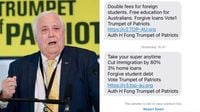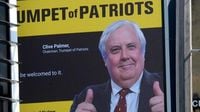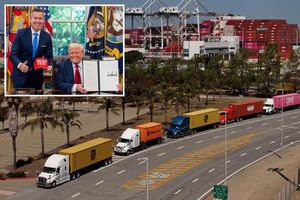As Australia gears up for the federal election on May 3, 2025, a wave of frustration has swept across the nation, with voters bombarded by unsolicited text messages from political parties, particularly Clive Palmer's Trumpet of Patriots. The messages, which many recipients describe as spam, have sparked widespread outrage and raised serious questions about privacy and the legality of such campaigning tactics.
Voters have reported receiving multiple texts from the Trumpet of Patriots, with some individuals noting that they have been contacted up to three times since the campaign ramped up on April 24, 2025. The texts, authorized by Harry Fong, the party's lead Senate candidate in Queensland, include a mix of policy statements and campaign slogans. One message reads, "Solve housing fast trains 20 min CBD cheaper land. Super for deposit 3% interest, cut immigration by 80%." Another states, "Double fees for foreign students. Free education for Australians. Forgive loans Vote1 Trumpet of Patriots." These messages have flooded social media, with recipients expressing their anger and confusion over how their personal information was obtained.
According to the Australian Communications and Media Authority (ACMA), political parties are exempt from the Spam Act and the Do Not Call Register, allowing them to send unsolicited messages without offering an opt-out option. This loophole has led to significant backlash, with many voters feeling their privacy is being invaded. As Dr. Pandanus Petter, a research fellow at the Australian National University, explained, "In a democracy, you need to have freedom of information and freedom of political communication in our constitution as well. So you're not allowed to have legislation [in Australia] which would stop people from spreading a political message." However, this legal framework has left many Australians feeling overwhelmed and frustrated.
“Clive texted me twice yesterday, once the day before — now at reasonable hours, he didn’t text me after dark which I’m very grateful about. But they are ridiculous and they’re part of what is, I think, a major flaw in our election system,” said James Willis, a journalist with The Daily Telegraph, during a segment on 7NEWS Sunrise. Willis emphasized that the Spam Act needs to change, highlighting the growing annoyance among voters. He questioned the methods political parties use to collect phone numbers, asking, "Where is this big list?"
Western Sydney Women Founding director Amanda Rose echoed Willis's sentiments, pointing out that there are no laws requiring political texts to be truthful. "They can say whatever they want," she noted, suggesting that the inundation of messages could ultimately backfire on the parties involved. "It’s only going to turn people off you if you bombard them — just like in any texting arrangement or email. Our laws need to change, and we actually need to make sure that whatever a politician or a party is saying is the truth," Rose added.
In addition to the text message controversy, voters have also raised concerns about unauthorized political signage. Over the weekend of April 26-27, 2025, an electronic traffic sign in Lane Cove displayed the message "put Labor last," prompting questions about the legitimacy of such political advertising. Similar signs were reported outside CommBank Stadium at Parramatta. According to the Australian Electoral Commission (AEC), all electoral communications must include an authorization statement to inform voters about the source of the message. The AEC has urged voters to remain skeptical of the information they encounter and to verify its authenticity through multiple sources.
Meanwhile, a dispute has arisen regarding political signs obstructing visibility for drivers near an early voting venue on High Street in Kew, in the federal electorate of Kooyong. Boroondara Council has reportedly requested that all parties reduce signage to one sign per candidate on public land. However, Liberal Party candidate Amelia Hamer has refused to comply, raising safety concerns among local residents. "I just saw someone try to cross the road and get stuck behind the signs while four lanes of peak hour traffic fly by," one concerned citizen tweeted.
As the election date approaches, the Trumpet of Patriots party, founded by mining magnate Clive Palmer, continues to face scrutiny over its aggressive campaigning tactics. Palmer, who previously led the United Australia Party, launched the Trumpet of Patriots in February 2025, promising to adopt many of the policies of former U.S. President Donald Trump. The party's platform includes proposals to cut immigration, establish high-speed rail networks, and exit international agreements like the Paris Agreement.
Despite the legal protections that allow political parties to send unsolicited messages, many Australians are left wondering whether such tactics are ethical. Social media has become a battleground for frustrated voters, with some sharing Harry Fong's contact information in a bid to retaliate against the spam. One individual posted, "I’ve never been so pleased to be a night owl as I am today. Have at him kids, text him and let him know how much you love his spam!"
As the debate over the legality and morality of political spam texts rages on, the AEC has confirmed that it does not provide political parties with voters' mobile phone numbers. Instead, parties may obtain numbers from marketing agencies or through data harvesting. This lack of transparency has only fueled the fire of public outrage.
With the federal election just days away, voters are left grappling with the implications of these unsolicited messages and the broader questions they raise about privacy, transparency, and the integrity of the electoral process. As Australians prepare to head to the polls, the effectiveness of such campaigning methods remains uncertain, with many voters expressing their desire for change in how political communication is regulated.






